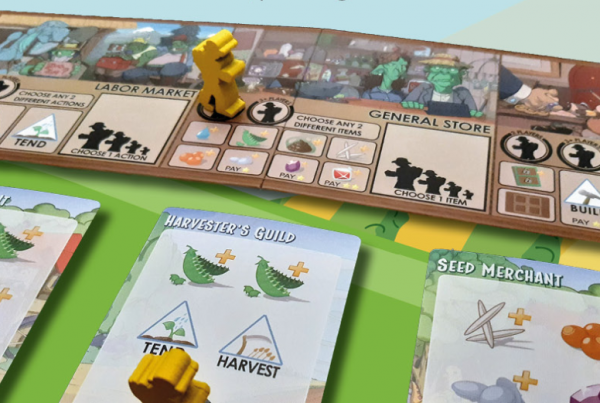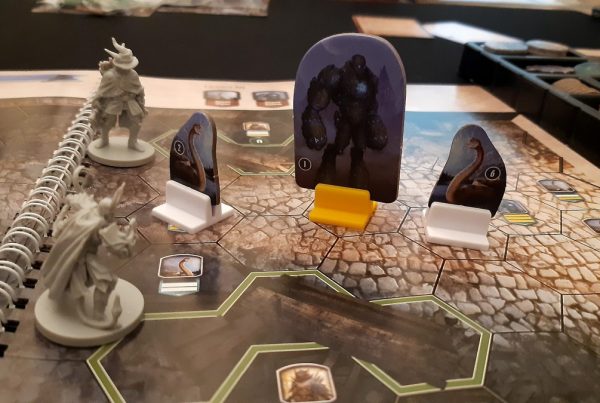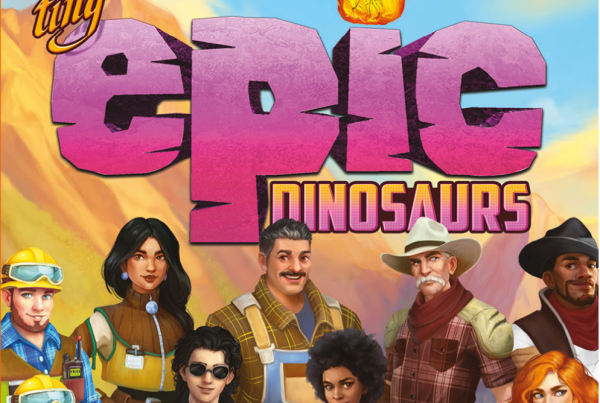From the Parallel Worlds archive.
DigiSprite are a three-person tabletop games studio based in Dundee, Scotland. Robyn is Managing Director and a designer, while Sam and Elaine are designers and writers — but they all wear lots of hats in between as well. They’ve been making tabletop games for five years now and have three games currently available: Doomsday Bots, Adventure Mart, and their most recent title, Familiar Alchemy. They try to make fun and engaging games with gorgeous art that anyone can pick up and play. We caught up with them.
Hey folks. Which of your games evolved the most from rough concept to finished product?
Robyn: Adventure Mart definitely went through the most iterations to get from initial concept to final product. The overall theme and idea behind it remained pretty constant throughout, but how we translated that into a playable design changed many times — it wasn’t even a deckbuilder for the first several versions!
Elaine: Adventure Mart for sure, how many versions did we end up going through before we hit 1.0, Sam?
Sam: Adventure Mart went through around eighteen full iterations of the card pool and rules. So I guess that evens out to be about one version per month of development. The largest shifts happened before and after conventions as we polished the game to be playtested in public, and after as we implemented feedback. And I think it was around version five where we implemented the deckbuilding engine into the game.
Boardgaming has recently seen its biggest boom in years. Are we in a tabletop golden age?
Elaine: Absolutely! I feel like it is easier than ever to find tabletop communities online and in your local area than ever before. We can share reviews, get excited about upcoming games, share exciting Kickstarters with friends from around the world. With more people adopting tabletop simulation programs, we can even play with friends, family and even complete strangers that could never normally sit down at a table together. Covid has put a bit of a damper on things in 2020 with most conventions being shut down, but I’m sure that when we emerge on the other side the boardgaming scene will be stronger than ever!
If you were stranded on a desert island and could only have one game to play there, what would you pick?
Elaine: Is it cheating if I take the largest stationary box and paper supply I can get my hands on and make our own games? That way we would never run out of games!
Robyn: Is it cheating to steal Elaine’s answer?
Elaine: Hey! Get your own pens!
Sam: These two are clearly cheating. I’m pretty sure I could survive with my massive Magic: The Gathering collection. All sleeved up to keep the sand out.
Adventure Mart went through around eighteen full iterations of the card pool and rules.
Besides your own creations, what games do you always recommend people try?
Robyn: Tokyo Highway by itten games is one that I often like to bring out with groups of friends. I’ve never really been one for dexterity games, but every time I’ve played it it has resulted in a lot of laughs and everyone having a good time. It also looks great on the table because of the ridiculous structures that end up being built with such simple components.
Elaine: I’m all about telling stories with games. Not even the most abstract Euro is safe from my overabundant imagination! So I love games that get people sitting around a table and creating a story together in as few steps as possible. To that end, I always recommend people try out Escape the Dark Castle/Sector, especially if they are new to storytelling and want to just sit down and experience a fun (and often grisly) story together.
Sam: I was really into Jaipur before lockdown began. A tight little one-versus-one duelling game that’s all about play-counterplay and pushing a bit of luck; all boiled down into a few key game actions that are easy to learn, and has a lot of depth. The games don’t take forever to complete. Easy to have a game over lunch. Personally I’m seeing a lot of value in smaller games these days.
Your latest game, Familiar Alchemy, involves a degree of mythology and botany. How much did real-world science influence your decisions?
Robyn: When designing Familiar Alchemy, I made sure that everything in it was related to something in the real world: from the Familiars based on creatures from Scottish folklore, to the plants based on native Scottish flora (with a magical twist) and even Beira, the Alchemist Extraordinaire, named after the mother of all gods and goddesses in Scottish folklore.
Elaine: Robyn and I live together and I can confirm that I saw a marked increase in the amount of plants in our home when we got deep into Familiar Alchemy development. She really would have made Beira proud! I on the other hand seem to kill any plants I touch. It’s a curse, really. So I trusted Robyn when she took the lead design position on the project that it would be based in botany of the non-plant-killing kind.
Sam: It was really key to the game that we married up the theme of botany and the mechanics, made sure that the plants functioned very plant-like. How they grow, and how they can be cut down selectively with your secateurs to harvest certain parts. With the Alchemy side of things we were free to use that space to add the cracks of spice that the game deserved to make it something special.
With the aforementioned boom in boardgaming, how can we make sure new players have a positive experience?
Elaine: I don’t know if there is a way to make sure new players have a good time, there are just so many factors! But for me it’s all about ease of access and taking the pressure off. Board games are a bit like movies or television in that everyone has their own tastes. You can’t just make someone enjoy movies as a whole! But you can recommend films you enjoy, genres, directors, artists etc. The same goes for board games in my eyes. That’s why I like to have a wide variety of games in our collection. Everything from lightweight dexterity games, mid-weight thematic Euros all the way up to crazy legacy monstrosities! I firmly believe that there is at least one board game out there for everyone — we just need to help new players find it.
Robyn: I think one of the biggest things would be to try and get rid of the “x isn’t a real board game, you should play y instead” kind of comments and attitudes. They never serve to help anyone and often just alienate new players or put them off. Everyone has their own tastes, and you’re not more of a board gamer if Twilight Imperium is your favourite game, or less of one if Monopoly is your favourite.
We should be aiming to create a fun and inviting tabletop community and not trying to police other people’s fun or tell them what they should and shouldn’t play.
Sam: I agree, I think these days there’s just so many board games on the market that you can’t guarantee that everyone’s going to like what you put out. Cultivating a positive experience I think is more about gaming with inclusive people, and hoping that everyone’s open to trying new things. “This one might not be for you, but let’s try it and see.” It’s not so expensive to try some new games if you’re able to find a group at your LGS [local game store] or a local club that you can integrate well with. Hopefully we’ll see more of these communities thrive after the global pandemic is more under control.
What influenced your decision to use Kickstarter for funding your games?
Robyn: We’ve found crowdfunding to be the best option for us for several reasons:
- It’s often not possible for a solo creator or small team to afford the full costs of creating a game upfront.
- Making a game is expensive! There would be nothing worse than investing the time and money to get a game to retail and then have it flop because there isn’t a market for it. Crowdfunding helps prevent this by getting your game in front of a large audience and ensuring it’s something that people actually want.
- It lets you gather lots of feedback and improve the end product by having the game in front of people who usually care about it and want it to do well.
- It can help build a community around your brand/games.
- You can retain full creative control and credit.
- You’re (almost) never going to quit your day job/go full-time off publisher royalties alone.
There are other routes a creator or team can take, such as publishers or outside investment — both of which we’ve experienced — but they have their own sets of pros and cons which need to be weighed up when deciding what’s best for your circumstances.
Elaine: Plus, I like to watch the numbers go up. So sue me!
What’s a trend in tabletop gaming that you love? And one that you hate?
Robyn: I’m really happy that more people and companies are becoming aware of the environmental impact of manufacturing tabletop games, and it’s great to see them making an effort to improve and spread awareness. We try to be conscious of this when designing our games and making decisions on components, materials, box sizes, etc.
Half related to the above and half general dislike is the prevalence of big-box games, especially those with lots of plastic minis. Huge boxes are usually difficult to take anywhere and to store, and in too many cases are so much bigger than they need to be with a lot wasted material and empty space in the box/inserts.
There are also a lot of games that use plastic minis when really they aren’t needed and something like a cardboard standee would be fine. They result in games being significantly more expensive (and larger) than they otherwise would be and in most cases (for me) don’t add anything to the gameplay experience. This feels like an unfortunate trend that may stem from crowdfunding, with some big minis games doing well and then others following suit/offering them as stretch goals to replace more traditional components.
I feel like it is easier than ever to find tabletop communities online and in your local area than ever before.
Elaine: Sorry, Robyn, I couldn’t hear you behind this mountain of miniatures! But yes, boxes being way too big or filled with way too much stuff tends to cause my face to make serious ‘yikes’ noises. I’m not innocent, of course. I’ve learned the hard way that often, less is more.
I love that we’ve started to see more creative and high-quality community content being produced over the last few years. Previously you pretty much had to rely on fairly impenetrable text-based forums like BoardGameGeek etc to get a feel for new or interesting games. But now we have content creators making interesting video reviews, streamers sharing actual plays, comics poking fun at genres — the list goes on! It makes discovering new games less of a chore and I love that.
Sam: I love that digital boardgaming is getting pushed more these days, but there’s still some hurdles to get there. For example, some people are put off the idea of having to buy four copies of the game to get a group together, even if the total price is less than a single copy of the physical release. Tabletop Simulator has been a great boon to the space; in fact, we used it to develop and remote-test most of Familiar Alchemy.
Something that really puts me off these days is the push of the big publishers for people to ‘keep up’ with their release schedules. It’s like they’ve got to put something out every month or fear they’ll be forgotten. This is most prevalent in the TCG [trading card game] space, but even the companies like Fantasy Flight Games and their Living Card Game models, I think, don’t seem to be solving this problem. Obviously they want to funnel players into their product cycle, but I think it has a negative effect on limiting a person’s desire to explore the space and find something new. I really could rant for hours on the current state of TCGs, and that’s coming from someone who really loves them.
I wish larger publishers would stay away from platforms like Kickstarter, when they clearly already have the budget to manufacture and market their game to begin with.
If you could make one change to the tabletop industry, what would it be?
Robyn: I’ve met a lot of amazing and lovely people through working in this industry, but there is definitely a problem with gatekeeping and toxicity towards newer/less experienced people and minorities which needs to change. Tabletop games are generally about bringing people together as part of an enjoyable, group experience, and trying to exclude people who just want to be a part of that, or shaming people for the games they play, isn’t acceptable.
Sam: I wish larger publishers would stay away from platforms like Kickstarter, when they clearly already have the budget to manufacture and market their game to begin with. For some of us, it’s the only route to manufacture and feeling like you’re getting pushed out by the big boys really sucks, but it seems like they feel like it’s the trendy thing to do to catch eyes.
Elaine: Yeah I agree with the above. More diverse and unique voices on both the developers’ and the players’ sides please!
Where do you see DigiSprite going from here?
Robyn: We still have lots of games and ideas brewing, so once Familiar Alchemy has settled down we’ll be picking up our next project. Currently, that looks to be the Adventure Mart roleplaying game (RPG)!
Elaine: We’re in the very happy position where we are small, agile and free to make what we want, how we want to. I’m really excited to get stuck into the Adventure Mart RPG, but we also have shelves upon shelves of other games in various states of prototyping. So really the future could be anywhere! Maybe not the moon though. Shipping would be a nightmare.
Sam: We’ve always wanted to work on RPG content, and given the state of the world, it’s a little bit easier for people to find playgroups online and there’s plenty of free online tools to facilitate it. The Adventure Mart RPG is a project that makes sense to us as we figure out what our next full-on board game experience becomes.
For me it’s all about ease of access and taking the pressure off.
And finally, who’s the best Familiar Alchemy player on the team?
Robyn: Being the designer, I’d love to say me — but Elaine definitely won the majority of our playtests.
Elaine: You’re damned right I did. You may be able to keep all the real world plants alive, but I’ve got you beat when it comes to growing magical board game plants!
Sam: Definitely Elaine, she’s got a chaos factor that’s hard to predict. Got to keep an eye on her.
Find Digisprite at: https://digisprite.co.uk/






